Iran’s judiciary claims it has no political prisoners. Human Rights Watch set out to prove them wrong. Researcher Faraz Sanei speaks with Amy Braunschweiger about the new Human Rights Watch report, who Iran is persecuting and why, and if President Hassan Rouhani – a self-proclaimed moderate – has the ability and willingness to do something about it.
So what’s the answer? Does Iran have political prisoners?
Yes, we believe there are several hundred in prisons throughout the country. We investigated three prisons – Rajai Shahr, Central, and Ghezel Hesar prisons – in Karaj, a city just west of Tehran. In these prisons alone we identified 62 political prisoners.
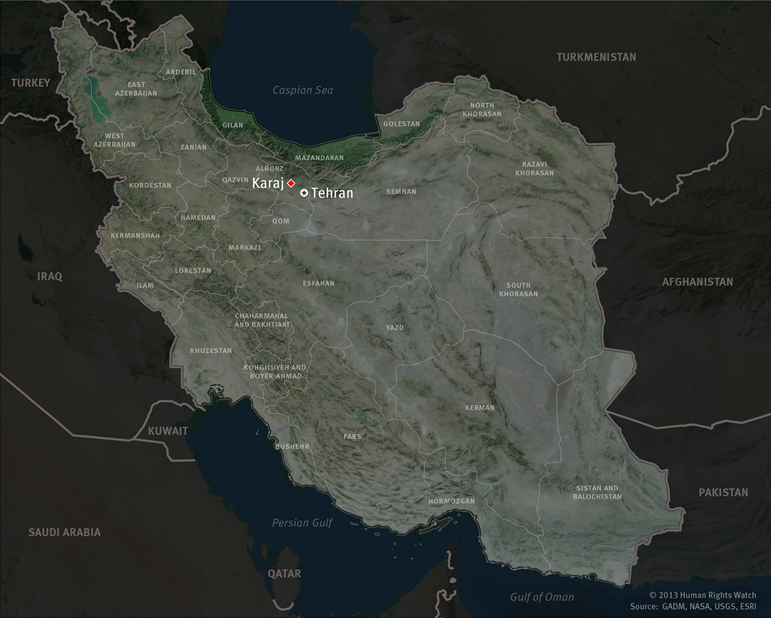
Human Rights Watch considers a person a political prisoner if they are imprisoned for exercising their right to free speech or religion, or for their peaceful political activities. But Iran refers to them as “national security” prisoners. Under Iranian law, this designation allows authorities to hold people in pretrial detention for months for interrogation, not allowing them to meet with their lawyers, see family members, or have any access to the outside world. They are tried in revolutionary courts, whose proceedings don’t respect international fair trial standards.
Many of Iran’s political prisoners are journalists or bloggers, rights defenders, or minority or religious activists. Some are members of the opposition. Many were simply peaceful protesters – like the ones who hit the streets in 2009 to demonstrate against presidential election results they thought were fraudulent. They are often charged with propaganda or collusion against the state. Together these two charges often result in four- to six-year prison sentences. Other charges we see include “insulting” the supreme leader, president or other government officials – which should never be a crime but is punished in Iran with prison sentences of up to two years.
What has happened to the Bahá'í religious minority seem particularly outrageous. Why have they been singled out?
© 2014 Private
More than half of the political prisoners we researched for this report, 34 to be exact, are members of the Bahá'í Faith, one of Iran’s most repressed religious minorities. Because their faith is considered an outgrowth of Shia Islam, many hard-line government and clerical establishments consider Bahá'ís heretics who have turned their back on Islam.
After Iran’s 1979 Islamic Revolution, Iranian authorities made a coordinated effort to crack down on Bahá'ís, keep them from advancing in society, and prevent their faith from spreading. Today, many Bahá'ís are effectively prevented from attending state universities, although the policy has relaxed somewhat. As a result, Bahá'ís started their own online universities. Iran’s government, of course, considered this illegal and disbanded the universities, arresting anyone affiliated with them. Some of the Baha’i educators are now in Rajai Shahr prison.
In fact, more than 150 Iranian Bahá'ís are behind bars, in prisons throughout the country.
When President Rouhani was elected a year ago, many hailed him as a reformer. What could this mean for Iran’s political prisoners?
Rouhani doesn’t consider himself a reformer. Rather, he says he’s a moderate. The reality is that his focus has been on repairing Iran’s economy and bringing it out from underneath international sanctions by signing an international deal to curtail Iran’s nuclear development program.
During his presidential campaign, he made reference to the political prisoners and human rights, but rarely, if ever used those exact words. Instead, he referred to a few individuals – including the opposition figures Mir Hossein Mousavi and Mehdi Karroubi, who were then, and still are, under house arrest without charge or trial – saying that he hoped to usher in a new period when they would be released. He also talked about allowing Iranians better access to the Internet and cutting back on censorship.
But there has been very little improvement in human rights since his election outside the release of a few political prisoners. A lot of this has to do with the fact that Rouhani doesn’t have control over Iran’s abusive intelligence ministry, its powerful Revolutionary Guards, or the revolutionary courts.
Is it possible that any of these prisoners committed a real crime, though? That they aren’t really political prisoners?
In the report, in addition to the 62 cases of political prisoners that we documented, we include 125 names of people in these three prisons who we can’t definitely label as political prisoners. There’s just not enough information available to us on their cases. But here’s what some of these prisoners have in common: They were refused access to their lawyer, placed in solitary confinement, or allege they were tortured until they confessed to a crime. Some were held in incommunicado pretrial detention. All these due process violations are typical of the patterns seen in political prisoners’ cases. We suspect the government may have targeted at least some of them because of their peaceful political or religious activities.
A number of prisoners affiliated with banned opposition groups, like the leftist Mojahedin-e Khalq Organization and several banned Kurdish groups, fall into this category. So do people the government alleges were involved with “Salafist” or “Wahabbi” groups, which Iran claims are terrorist groups, but whose members describe themselves as Sunni activists. At least some appear to have been targeted for their religious or political opinions.
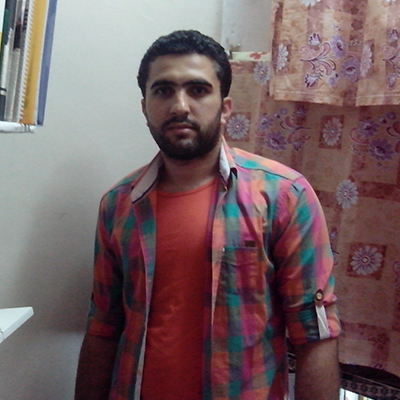
Zaniar Moradi © 2014 Private |
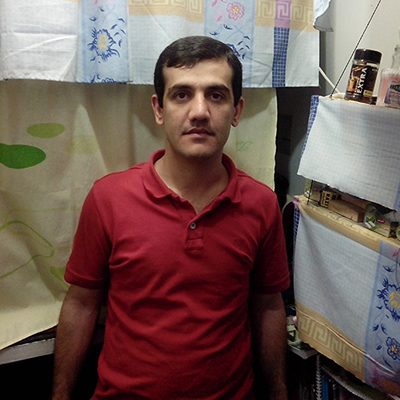
Loghman Moradi © 2014 Private |
Two specific examples are cousins, Zaniar and Loghman Moradi, ethnic Kurds convicted by a revolutionary court on charges of membership of an outlawed Kurdish political party, Komala, and murdering the son of a Sunni cleric. Did they commit the murder or should we believe their denial? We can’t be certain. But we do know their trial was unfair and a disgrace, and that many questions they raised at it have gone unanswered.
The cousins said that security officials held them incommunicado for months at a detention facility run by the Intelligence Ministry, and they claim that no one told them they would be charged with murder. Both alleged that they were tortured, and described the methods of torture used against them in vivid detail. They said their trial only took 20 minutes, and that the court found them guilty, at least in part, because security officials alleged that they had confessed to the murder – which both cousins deny. Now both are on death row for allegedly killing the cleric’s son.
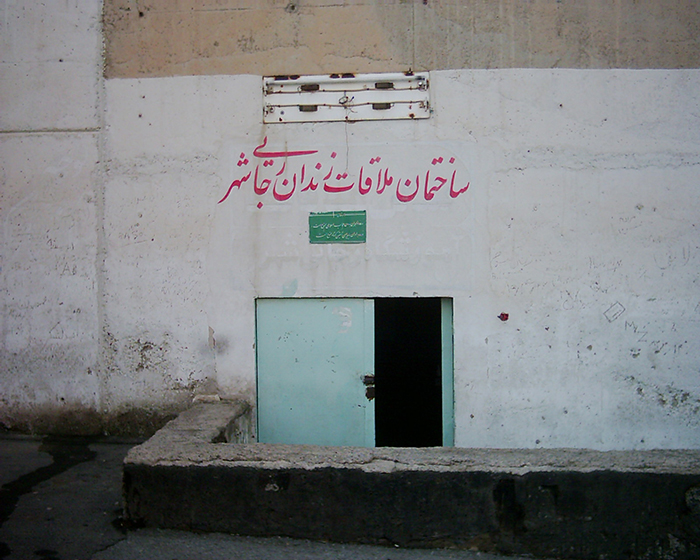
The visitation room for Rajai Shahr prison © 2004 Private |
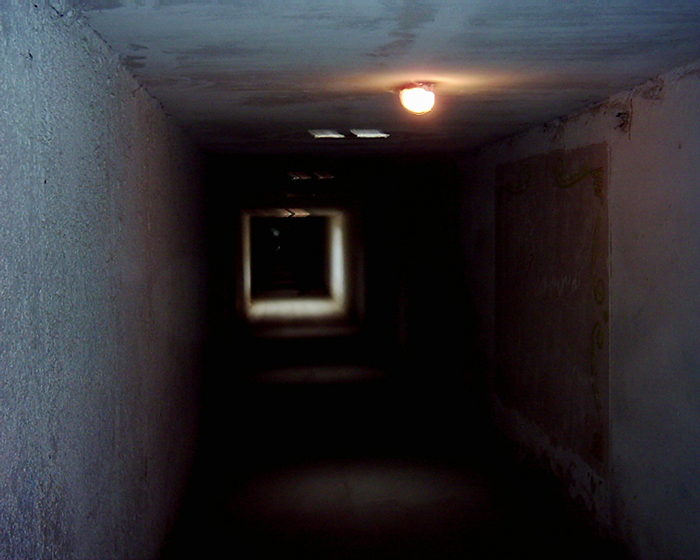
The hallway leading to the visitation room for Rajai Shahr prison © 2004 Private |
What do you want to see happen in this instance?
At the very least authorities should investigate the due process allegations and vacate the death sentences. The cousins should have a retrial that conforms to international fair trial standards.
And how about for political prisoners?
We are calling on Iranian authorities to release all political prisoners immediately and unconditionally. While we understand Rouhani may not have the power to do this alone, we feel he can do more to make this issue a part of the national dialogue and show Iranians that he is willing to fight for justice on their behalf.




